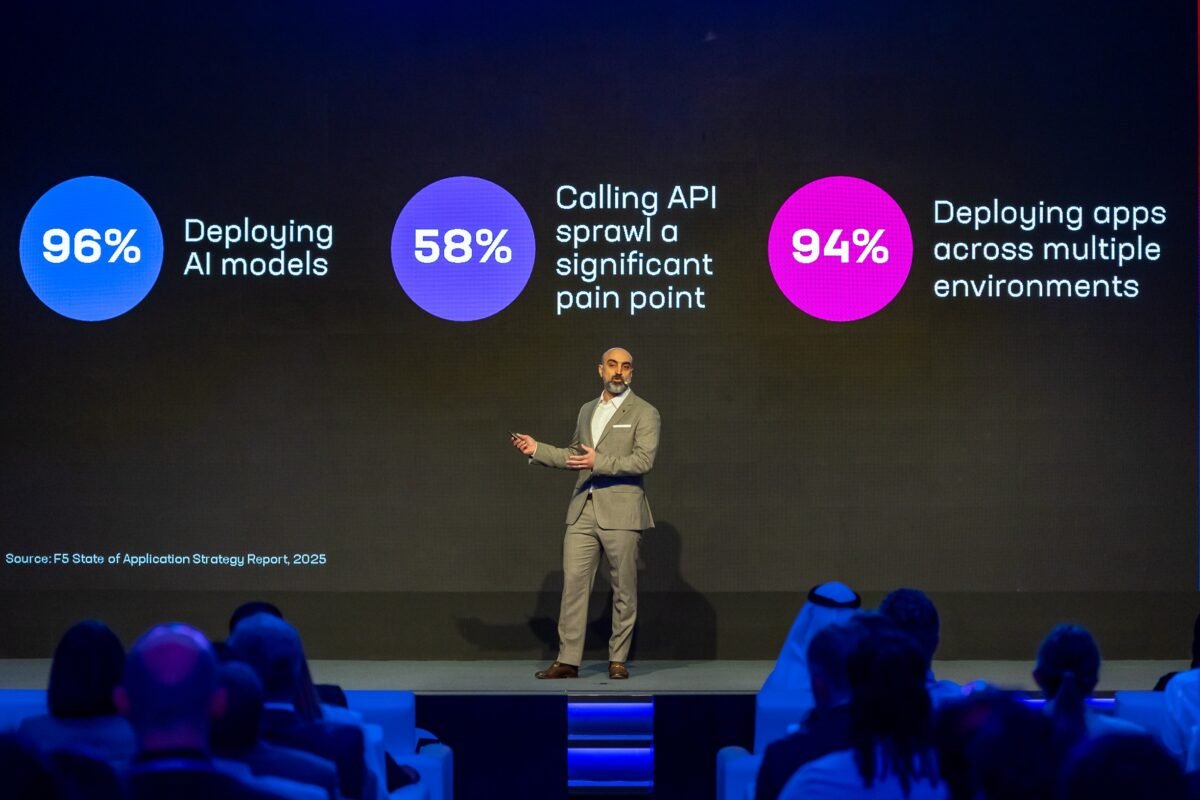As artificial intelligence (AI) rapidly reshapes global industries, many organizations remain blind to the growing complexity of today’s fragmented, hybrid, and multicloud environments.
U.S.-based F5, a leading provider of multicloud application delivery and security, warns that without robust protections, these very environments risk turning powerful innovations into serious vulnerabilities.
During the first EMEA stop of its AppWorld 2025 roadshow in Dubai last week, F5 raised serious concerns that AI adoption was moving faster than most enterprises can securely support.
“Modern enterprises are navigating increasingly intricate hybrid, multicloud IT landscapes where countless applications and APIs are scattered across diverse environments,” said Mohammed Abukhater, Regional Vice President for the Middle East, Türkiye, and Africa at F5. “As AI-powered applications become a core part of these distributed systems, the complexity is only going to intensify.”
The company pointed out that the risks from weak security, outdated workflows, and ongoing skill shortages are growing rapidly. It added that if these issues are not addressed soon, they could seriously undermine the benefits that AI is expected to bring.
With more enterprises building or integrating large language models and other forms of AI into mission-critical applications, new vulnerabilities are emerging, from unprotected APIs and model poisoning to adversarial prompts and unintended data leaks.
For security and IT leaders, the challenge is not just about keeping bad actors out, but about understanding what is running, where, and how it interacts across a sprawling digital landscape, according to F5.
To help organizations address these evolving threats, F5 showcased its newly announced Application Delivery and Security Platform (ADSP), a consolidated system designed to help enterprises manage and secure modern applications across any digital environment.
The platform, which the company says is the first in the industry to combine high-performance load balancing with advanced application and API security in one framework, was built to operate seamlessly across physical hardware, virtual machines, hybrid cloud environments, and cloud-native SaaS.
“This is a strategic response to a market that demands consistency, visibility, and control across every environment, whether it’s high-performance on-prem data centers, virtualized deployments, hybrid cloud, or fully SaaS-based architectures,” said Vincent Lavergne, Vice President of Solutions Engineering for EMEA at F5.
According to him, the platform enables enterprises to enforce unified security and traffic policies for all applications, regardless of where they are hosted or how they are deployed.
Lavergne also highlighted the need for organizations to modernize their approach to cybersecurity.

As attackers become more sophisticated and seek out novel entry points, such as vulnerable APIs or client-side browser scripts, traditional perimeter-based security approaches are proving inadequate. “The infrastructure powering AI must be just as intelligent and adaptive as the applications it supports,” Lavergne stressed.
Part of the company’s focus in Dubai was to demonstrate how its platform supports the secure deployment of large language models and other AI tools. One feature, purpose-built for this emerging need, allows organizations to scan AI models for security vulnerabilities before they are deployed into production environments.
Another capability expands visibility into APIs, a growing area of concern for security teams, by enabling full discovery across all applications running on F5’s BIG-IP platform. With APIs increasingly seen as the connective tissue of digital services and often a weak point for hackers to exploit, such visibility is becoming critical.
Also on display were enhanced protections against client-side threats, including new defenses designed to help organizations comply with the latest revisions to the Payment Card Industry Data Security Standard.
These updates require companies to take more responsibility for protecting users against browser-based attacks and data exfiltration risks stemming from malicious scripts embedded in web applications.
The concerns raised by F5 come at a time when the market is undergoing a dramatic shift. Industry data suggests that nearly all large enterprises have either deployed or are actively developing AI models, a striking leap from just two years ago.
This surge in adoption is taking place amid continued growth in multicloud strategies, where businesses use a combination of cloud platforms to manage different parts of their digital estate. Gartner projects that over 90 percent of global enterprises will operate in multicloud environments by 2027, adding further layers of complexity to an already fragmented technology stack.
The promise of AI also comes with a rising cost. According to IBM’s latest security research, the average data breach now costs organizations more than $4.5 million globally, with attacks increasingly leveraging AI techniques themselves to find weaknesses, automate exploits, and bypass traditional defenses.
Against this backdrop, experts warn that enterprises must rethink how they secure their digital environments, treating AI not just as a tool of innovation but also as a potential vulnerability.
This call for greater vigilance is especially relevant in regions like the Middle East, where governments are investing heavily in AI and digital transformation. Dubai, for example, has aggressively pursued national AI development and cloud computing strategies, recently announcing plans to train thousands of specialists in AI-related fields as part of its 2031 vision to become a global leader in the sector. According to IDC, digital infrastructure investment in the region is expected to exceed $50 billion in the next five years, presenting vast opportunities but also significant risks if security fails to keep pace with innovation.
Speaking from the event last week, Abukhater noted that Dubai’s digital-first posture offers valuable lessons for other regions. “With governments and businesses moving fast to adopt cloud and AI, the question is no longer whether to invest in new technologies, but how to secure them at scale. Enterprises cannot afford to treat security as an afterthought,” said Abukhater.
Building on this point, F5 noted that to thrive in this new era, businesses would need infrastructure that is not only powerful and agile, but resilient and secure from the ground up.





